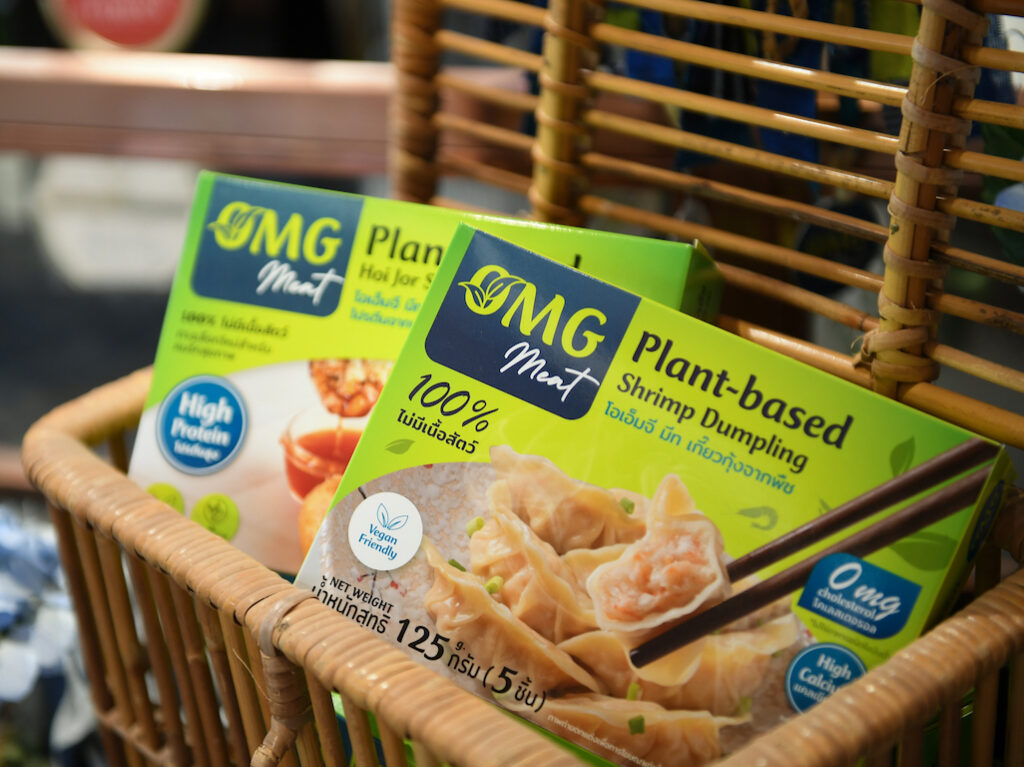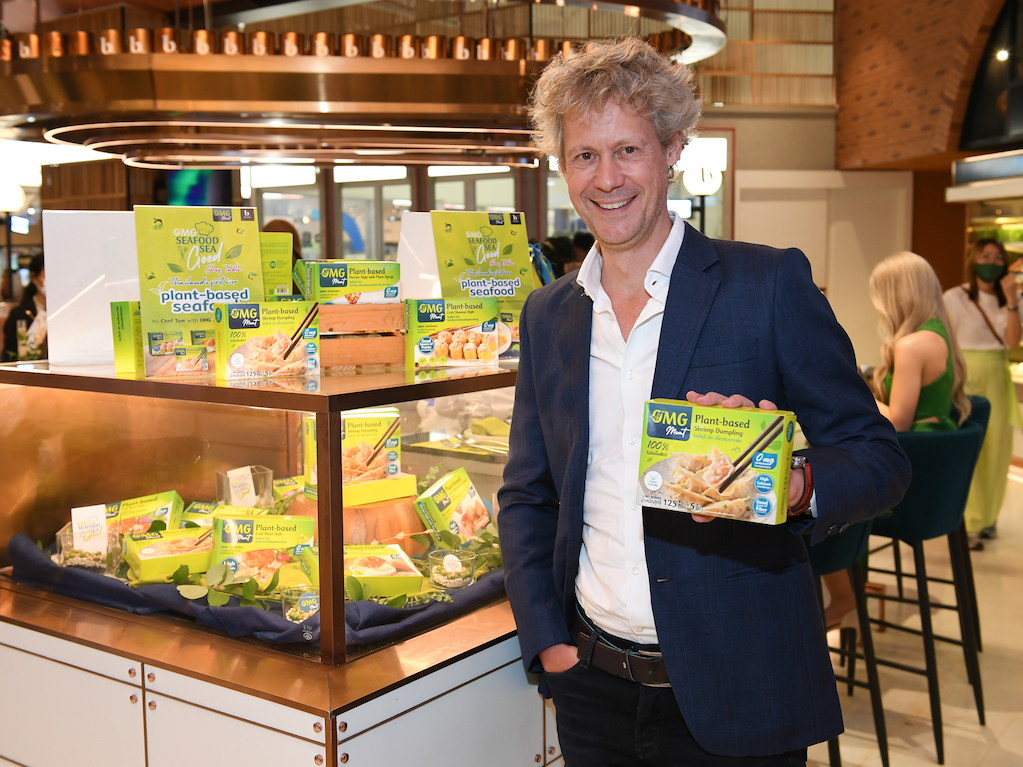Thai Union’s Alt Protein MD Talks Sustainable Seafood Solutions, Cultivated Meat And The Future Of Plant-Based
8 Mins Read
Global seafood company Thai Union has made alternative proteins a key part of its future business strategy. Not only has the company launched multiple lines of plant-based seafood alternatives including vegan tuna under its flagship John West brand and OMG Meat, an Asian range featuring crab meat, shrimp dumplings, and fish nuggets, the Thai giant is backing cellular agriculture too. It invested in Israeli-cultivated beef startup Aleph Farms and is partnering with US cell-cultured seafood player BlueNalu.
Green Queen‘s Sonalie Figueiras talks to Thai Union’s alternative protein managing director Maarten Gereats about what’s driving the company’s work in this area, why it created a standalone position dedicated to the industry, the Asian consumer appetitive for sustainable food solutions and what’s missing in the space. Hint: It’s not funding.
Why is Thai Union investing in alternative proteins? What’s driving the company in this area?
Maarten Geraets: Our renowned brands across the world, including John West, Petit Navire, and Chicken of the Sea, are underpinned by our significant manufacturing base in Thailand. Our deep understanding of the seafood market, combined with our manufacturing capabilities, means Thai Union is well placed to build the alternative proteins category, scale up efficiently and drive costs down – for customers globally and especially in Asia. Thai Union’s ambition is to become a powerhouse in Asian plant-based manufacturing, servicing customers’ needs through our Global Innovation Centre (GIC ) know-how and capabilities, assets on the ground and powerful ecosystem.
We are focused on insight-driven innovation – this is what drives our business, and the entire seafood industry, forward. We know that consumer tastes are changing, and we want to provide them with the choices they seek. At Thai Union, we are leveraging our capabilities as an original equipment manufacturer (OEM) partner, as well as the innovation capabilities of the wider Group and our industry-leading GIC and our open innovation partnership via our Bangkok-based SPACE-F incubator and accelerator program.
You have a unique role at Thai Union, as the standalone MD of alt proteins. Why was this position created?
Maarten Geraets: The position of a standalone Alternative Proteins MD reflects our commitment to the space, ensuring a single-minded focus, commercializing the proposition, and driving this globally. Under my stewardship, our team is working end-to-end, from sourcing raw materials to marketing end products. I report directly to the CEO, so the buy-in is there. At the same time, we’re playing it smart, leveraging existing infrastructure where possible and finding the right partners where relevant.

What do you think motivates these consumers when they purchase plant-based products? Is seafood different compared to meat?
Maarten Geraets: These products are perceived as modern and on-trend – health is a secondary consideration. In Thailand, the Jae-Fest vegetarian festival is a key ‘taster’, as for 10 days people switch to a vegetarian diet – the key is how to leverage this. Our aim is to expand our audience from ‘early adopters’ to ‘mainstream’ consumers – this is the journey Asia is on.
There are only a few places globally where alternative proteins are really moving closer to a mainstream consumer market. In my opinion, Asian dishes (like wontons or dumplings) are ideal for plant-based solutions!
Alternative seafood is a new category, with limited awareness, whereas meat is more established. However, seafood is bound to catch up soon. Health is less of a concern for seafood, whereas sustainability will be more of a lever. This will take time in Asia.
Do you feel that Asian consumers are aware of their need to reduce dependence on animal proteins?
Maarten Geraets: There is limited awareness amongst Asian consumers, and animal protein is still perceived as aspirational. In certain markets, such as Hong Kong and Singapore, we’re seeing some traction but the price premium for alternative proteins is proving a barrier. However, the need is there and we expect consumer behaviour to shift over time. Increased health concerns in the wake of the pandemic and bird flu will help drive awareness of the issue, as will education, marketing and government intervention. Currently, consumers’ diet in Asia is over 40% meat, and in India, consumers are still moving towards more non-vegetarian diets. This presents significant opportunities, especially given the size of the Asian population.
As an industry, how should we be thinking about alternative proteins? What’s missing from the conversation?
Maarten Geraets: We have learnt by doing that not all plant-based solutions work exactly the same. The applications vary. And that’s a good thing. We need to think beyond just copying the traditional protein. These are new offerings. They require new behaviour and they provide new opportunities. As a consumer, you may want the nutrition of the fish without the taste of the fish, and we can deliver on this. The nutrition will not be the same [as the conventional option] and that’s ok, that’s a good thing even.
The question we need to ask ourselves is: do we mimic what’s out there now or do we create new? I think we should be creating new product formats and not always be comparing these to the conventional/existing ones. In the future, I think we will have a broad spectrum of solutions: real tuna, plant tuna, cultivated tuna and hybrid tuna on the shelf, a multitude of alternatives will be available to consumers. Each will have its own space – depending on application, use, and price.
As an industry, we need to think differently. What matters is that it needs to be a good eating experience, it doesn’t need to be a one-to-one equivalent. And then you get away from always comparing on price, taste, texture or nutrition.
If we consider the question: as an industry, why did we start with mimicking? It’s because we believe it’s the easiest switch to make for consumers, giving them a one-to-one solution. One major advantage of mimicking? People know how to cook it and prepare it. But in reality, it’s not the easiest switch. I think slowly we need to evolve to new propositions – we often speak internally about moving to ‘new seafood experiences’.

What is the response to Thai Union’s plant-based range OMG Meat? Are you planning to launch more OMG Meat SKUs?
Maarten Geraets: I do think that plant-based meat and plant-based seafood meat work really well in ready foods and “in-application” formats like spring rolls or gyozas or dumplings, as well as sauces and meals. This is one of the best ways to engage consumers, and we’ve had a positive response, despite the category still being small and fiercely competitive. Our ability to differentiate with seafood helps, and we look forward to launching further solutions for consumers. We can share more details when we’re making our next steps here.
How do you approach marketing for OMG?
Maarten Geraets: OMG is here to drive, pilot, and experiment in our local home market. It is both our test kitchen in Thailand, and a showcase to the world of our products and capabilities.
For example, our Plant-Based Shrimp Dumplings have received global recognition with a recent nomination in the prestigious Gulfood Innovation Awards. Thai Union leverages these successes for our global brands, and as an OEM manufacturing partner.
Our OMG marketing is otherwise focused on social media and driving trial, especially during critical moments like the Thai J-fest vegetarian festival, when consumers are most receptive.
What are the most important seafood product categories/formats that need alternative protein innovation right now?
Maarten Geraets: To ensure scale you need to work on what drives volumes, and for Thai Union globally it is tuna and shrimp. Additionally, ambient [non-frozen, non-chilled] formats will be key in Asia to drive distribution and lower prices.
Thai Union invested in Aleph Farms and is working with cultivated companies like BlueNalu. How would you position cultivated seafood within your current product offering?
Maarten Geraets: Investments are made through Thai Union’s Corporate Venture Capital (CVC) Fund, which targets ‘deep-tech’ solutions. This is for us to learn, be close to the ‘future action,’ and support them as strategic investors going forward. With a strong belief in alternative proteins, we want to ensure we stay ahead of the curve and are involved in this space.
Cultivated seafood presents one of these alternative solutions, and looking to the future, a multitude of alternatives will be available to consumers. Our CVC invests in deep tech to explore new technologies of the future. This is why cultivated seafood is part of our investment portfolio. Being a strong Asian-based player, we can help these startups access the large Asian market. Furthermore, besides population, Singapore is the only place where cultivated meat actually is allowed to be sold.
What is inspiring in the alternative protein industry right now?
Maarten Geraets: Here’s what inspires me:
- The passion and commitment within the category – we’re united in tackling criticism and pushing forward. The world needs this change, and it takes true believers to make it happen.
- The level of collaboration and the willingness to partner and leverage open innovation to achieve the same goals. Powerful ecosystems will be the new way forward.
- The opportunity for Asia to lead this transition – we are rapidly innovating, investing in technology, and have a receptive consumer market.
What is missing in the space right now when it comes to marketing and consumer engagement?
Maarten Geraets: I see a huge opportunity and a need for stronger marketing in this new alternative protein category.
The average consumer is becoming more aware of animal welfare and sustainability, it’s true and this is becoming a more important part of the selection criteria when they are buying food, but this is still a very small group.
We’ve observed that most people buy more directly for what impacts them directly today: nutrition, health, their own welfare. This average consumer is not buying as much for the impact on the planet.
To date, the category has largely focused on early adopters, prepared to pay a premium to explore and try. As a result, the messaging was all around the novelty of alternative proteins and the ‘wow’ factor – the technology behind it.
The opportunity for us to drive change is with people who ‘flex’ -people who cycle between the different options. One night it may be plant-based dumplings, another day, conventional tuna.
There is a lot of storytelling to be done in the space. Food is not tech. Food is food. There’s a huge amount of emotion involved. We can adapt to a new gadget or new software in a few days, like with ChatGPT. We can incorporate it into our lives quickly. Food is not the same. Food is deeply cultural.
It’s time to evolve the message – we need to build new propositions (so ‘not just another burger’), address new consumer needs and develop more meaningful connections with consumers. We need to move on from negative storytelling (‘meat is bad, we are good’) and both educate and excite consumers about our proposition. This new category needs marketers to find new ways of telling our story, not simply replicate what’s been done previously.




